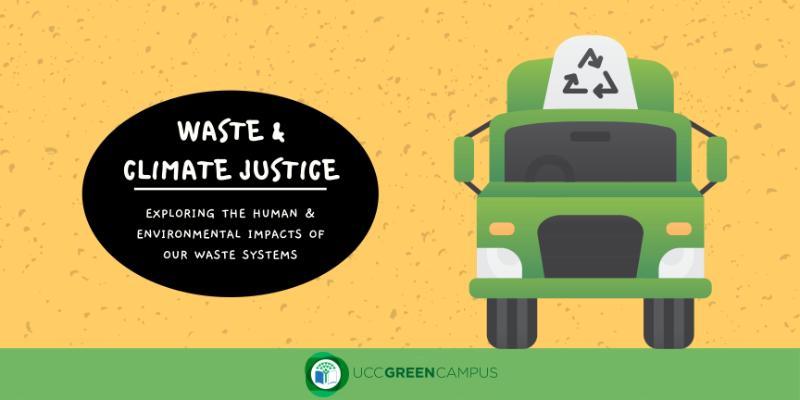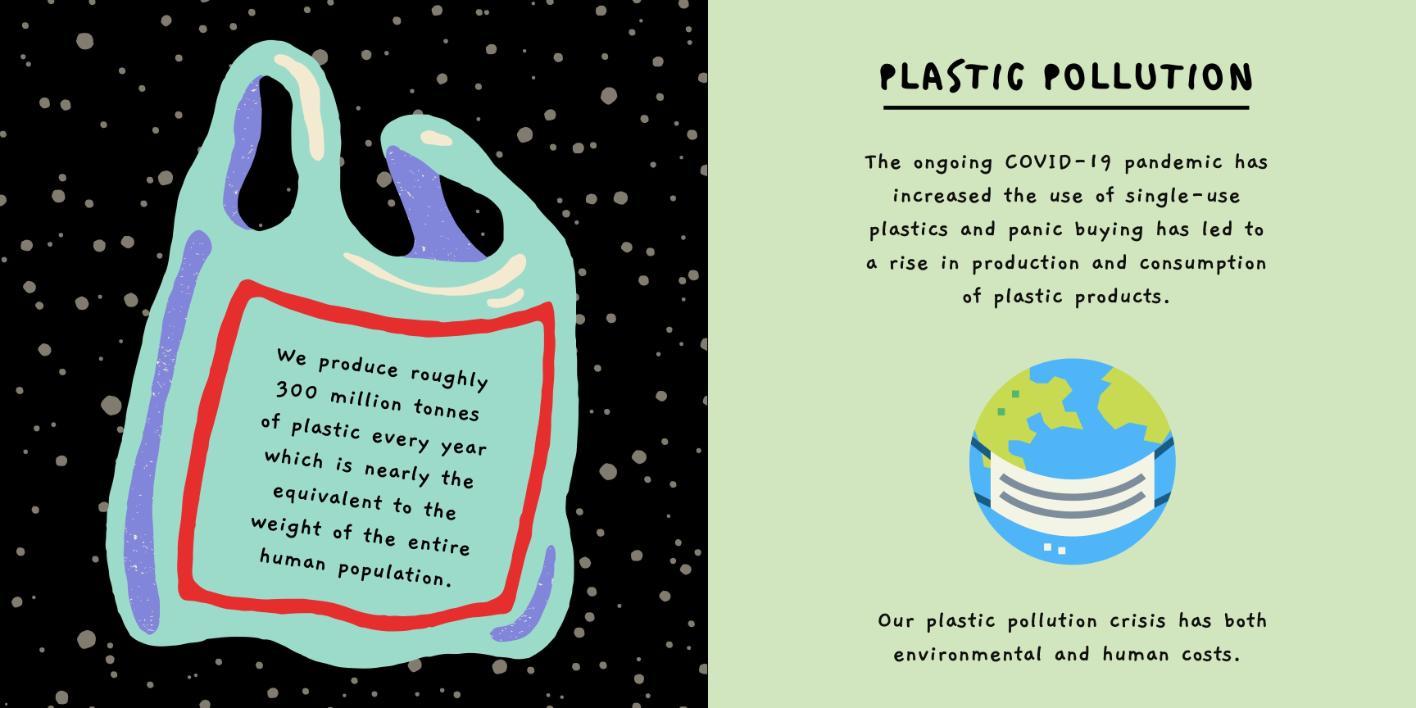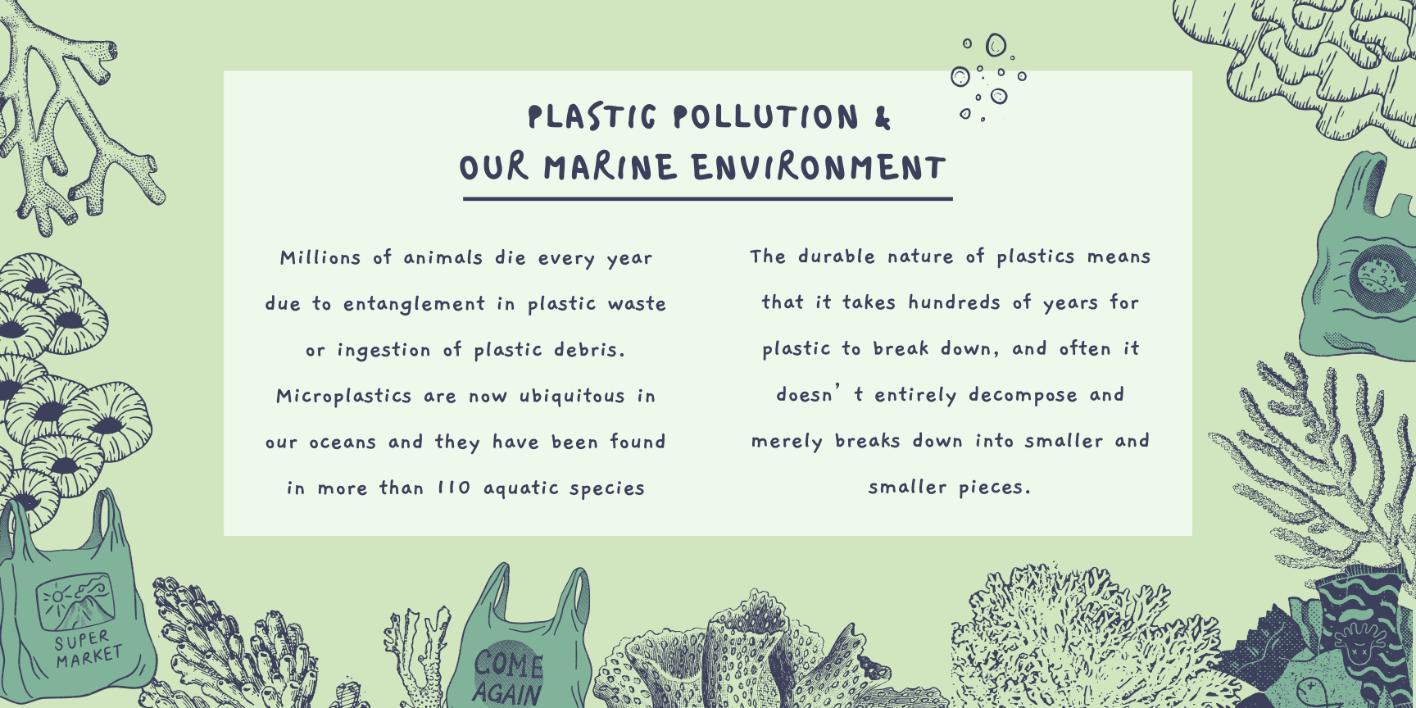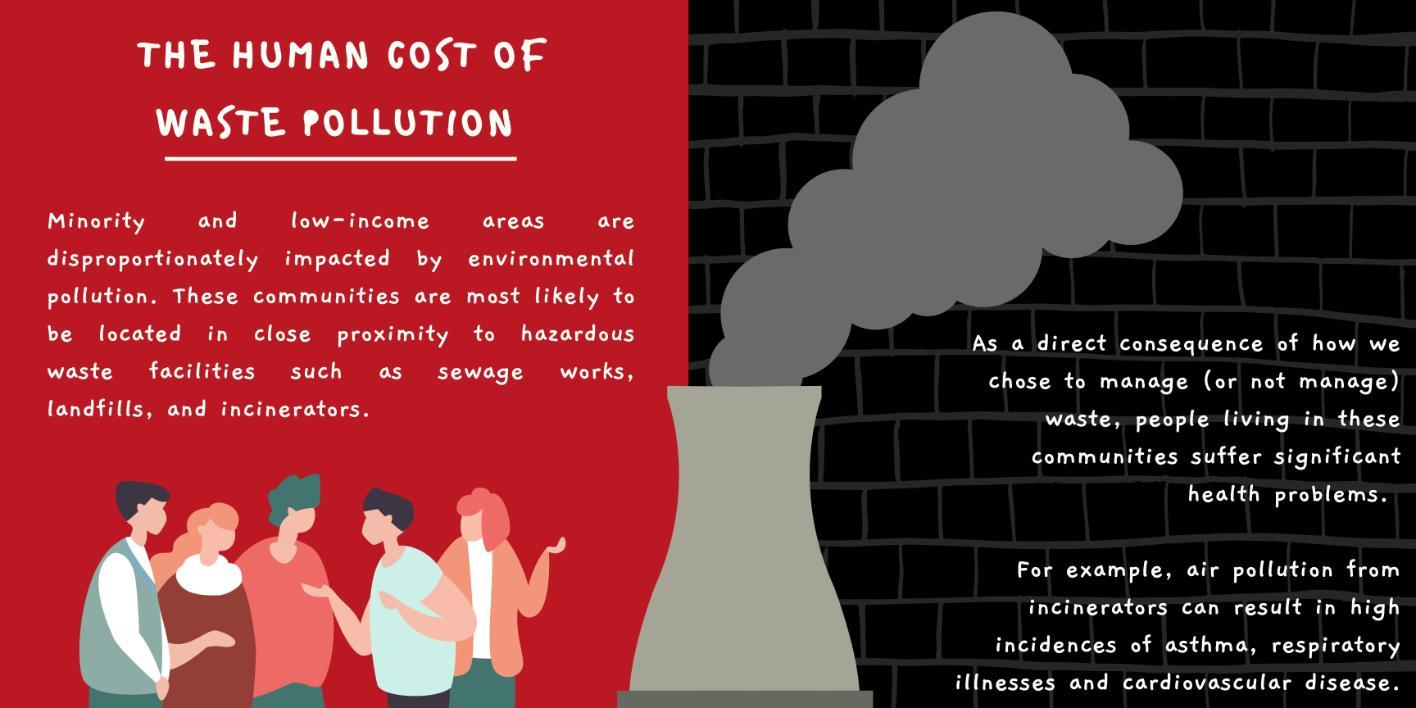- Home
- About
- Student Led
- Research Informed
- Practice Focused
- Resources
- News
- Green Campus Podcasts
- Case Studies
- Green Labs Community
News
Waste & Climate Justice

The next climate justice topic that we’re going to discuss is centred around waste. Waste production has skyrocketed across the world in recent decades due to globalisation, population growth, overproduction, and consumer shopping habits[1]. People living in Ireland now produce more than 13 million tonnes of waste every single year[2]. This mass production of waste is a climate justice issue due to its negative impact on our planet and vulnerable populations.

Plastic Pollution
Plastic production and use have increased exponentially in the past 50 years, and today, we produce roughly 300 million tonnes of plastic every year which is nearly the equivalent to the weight of the entire human population[3]. The ongoing COVID-19 pandemic has increased the use of single-use plastics and panic buying has led to a rise in production and consumption of plastic products[4]. Our plastic pollution crisis has both environmental and human costs.

The most commonly talked about side of plastic pollution is the effect it has on our marine environment. Millions of animals die every year due to entanglement in plastic waste or ingestion of plastic debris. Microplastics are now ubiquitous in our oceans, and they have been found in more than 110 aquatic species[5]. The durable nature of plastics means that it takes hundreds of years for plastic to break down, and often it doesn’t entirely decompose and merely breaks down into smaller and smaller pieces. The implications of plastic contamination for humans who consume seafood is still being investigated[6] and the size, shape, polymer type, and chemical composition of the ingested plastic impacts its retention rate in the human body[7].
The less discussed side of plastic pollution are the implications it has for people and vulnerable populations. The extensive pollution of our oceans and marine animals threatens the livelihoods of the individuals who depend on marine resources for work[8]. Plastic waste also has social and health impacts. In 2018, China stopped accepting imported plastic waste and so plastic is now being exported to countries such as Ethiopia and Senegal[9] that lack the appropriate infrastructure to safely dispose of it[10]. This results in massive waste dumps that openly burn plastic which has detrimental health effects on the people living in the vicinity[11]. A black market has also developed in which brokers offer to dispose of waste in an illegal manner in sparsely populated areas[12].
Massive corporations such as Unilever and Nestlé continue to push recycling as the solution to this problem. However, our recycling systems are flawed and a huge reduction in plastic production is needed to tackle this issue. Furthermore, plastics are derived from fossil fuels which are significant contributors to the ongoing climate crisis. Half of all plastics ever manufactured on earth have been produced in the past 15 years[13] and we cannot continue at this rate of production if we wish to protect our environment, our precious biodiversity, and vulnerable populations.

Waste Disposal & Social Inequalities
Given the mass production of waste, we need many facilities and treatment plants to dispose of our waste. Environmental racism[14] is rampant in our world and minority and low-income areas are disproportionately impacted by environmental pollution[15]. These communities are most likely to be located in close proximity to hazardous waste facilities such as sewage works, landfills, and incinerators[16]. In the U.S, indigenous communities continue to be subjected to high levels of radioactive and hazardous wastes[17].
As a direct consequence of how we chose to manage (or not manage) waste, people living in these communities suffer significant health problems. For example, air pollution from incinerators can result in high incidences of asthma, respiratory illnesses, and cardiovascular disease. Water contamination from landfills can negatively impact local water quality, and community recreational areas[18] which consequently harms those who utilise these water sources.
To improve waste management and tackle the disproportionate impacts that waste disposal is having on minority communities, people of colour must have the opportunity to lead and contribute to policy development and sustainable initiatives. Climate justice is social justice, and we must work together to protect marginalised communities and create an equitable and sustainable society for all.

What can you do?
- Take steps to reduce your consumption of single-use plastics in your everyday life.
- Support campaigns and policy that work to reduce waste production. In 2018, thanks to the student body, UCC pledged to make UCC a single-use plastic free campus by 2023. We must continue to push for sustainable initiatives and hold organisations accountable for their waste production.
- Get proactive in your community and take part in litter-picking events to clean up your local area.
Waste pollution is extensive, and this situation will only continue to worsen if we fail to act. The human population will always produce waste and plastic is a vital tool in our modern lives. However, our waste systems and our perspectives on consumption and throwaway culture must be re-examined to tackle this global issue.
[1] Statista, ‘Global waste generation - statistics & facts’ https://www.statista.com/topics/4983/waste-generation-worldwide/#topicHeader__wrapper
[2] Environmental Protection Agency, ‘National Waste Statistics’ https://www.epa.ie/our-services/monitoring--assessment/waste/national-waste-statistics/
[3] United Nations Environment Programme, ‘Beat Plastic Pollution’
https://www.unep.org/interactive/beat-plastic-pollution/
[4] S. Sarkodie. And P. Owusu, “Impact of COVID-19 pandemic on waste management’ (2002) https://www.ncbi.nlm.nih.gov/pmc/articles/PMC7447614/
[5] E. Royte, ‘We Know Plastic is Harming Marine Life. What About Us?’ National Geographic (June 2018)
[6] See for more information: Z. Villines, “What to know about plastics in seafood” Medical News Today (27 October 2020) https://www.medicalnewstoday.com/articles/plastics-in-seafood#health-risks; A. Smith, ‘There Is Plastic In Your Fish’ Forbes (21 June 2020) https://www.forbes.com/sites/ariellasimke/2020/01/21/there-is-plastic-in-your-fish/
[7] M. Smith, et al., “Microplastics in Seafood and the Implications for Human Health” (2018) Food, Health, and the Environment (5) page 380 https://www.ncbi.nlm.nih.gov/pmc/articles/PMC6132564/pdf/40572_2018_Article_206.pdf
[8] United Nations Environment Programme, ‘Plastic pollution is an environmental injustice to vulnerable communities - news report’ https://www.unep.org/news-and-stories/press-release/plastic-pollution-environmental-injustice-vulnerable-communities-new
[9] E. McCormick, et al., ‘Where does your plastic go? Global investigations reveals America’s dirty secret’ The Guardian (17 June 2019) https://www.theguardian.com/us-news/2019/jun/17/recycled-plastic-america-global-crisis
[10] C. Joyce, ‘Where Will Your Plastic Trash Go Now That China Doesn’t Want It?’ NPR (13 March 2019) https://www.npr.org/sections/goatsandsoda/2019/03/13/702501726/where-will-your-plastic-trash-go-now-that-china-doesnt-want-it?t=1631617091789
[11] K. Lin, ‘ Why plastic pollution is an environmental justice issue’ Greenpeace (23 April 2019) https://www.greenpeace.org/international/story/21792/plastic-waste-environmental-justice/
[12] J. Kwon, ‘South Korea’s plastic pollution is a literal trash fire’ CNN (3 March 2019) https://edition.cnn.com/2019/03/02/asia/south-korea-trash-ships-intl/index.html
[13] L. Parker, ‘The world’s plastic pollution crisis explained’ National Geographic (7 June 2019)
https://www.nationalgeographic.com/environment/article/plastic-pollution
[14] P. Beech, ‘What is environmental racism and how can we fight it?’ World Economic Forum (31 July 2020) https://www.weforum.org/agenda/2020/07/what-is-environmental-racism-pollution-covid-systemic/
[15] J. Erickson, ‘Targeting minority, low-income neighbourhoods for hazardous waste sites’ https://news.umich.edu/targeting-minority-low-income-neighborhoods-for-hazardous-waste-sites/
[16] Ibid.
[17] Scientific American, ‘Reservations about Toxic Waste: Native American Tribes Encouraged to Turn Down Lucrative Hazardous Disposal Deals’ https://www.scientificamerican.com/article/earth-talk-reservations-about-toxic-waste/
[18] C. Yang, ‘Q&A: Addressing the Environmental Justice Implications of Waste’ EESI (14 May 2021) https://www.eesi.org/articles/view/qa-addressing-the-environmental-justice-implications-of-waste
